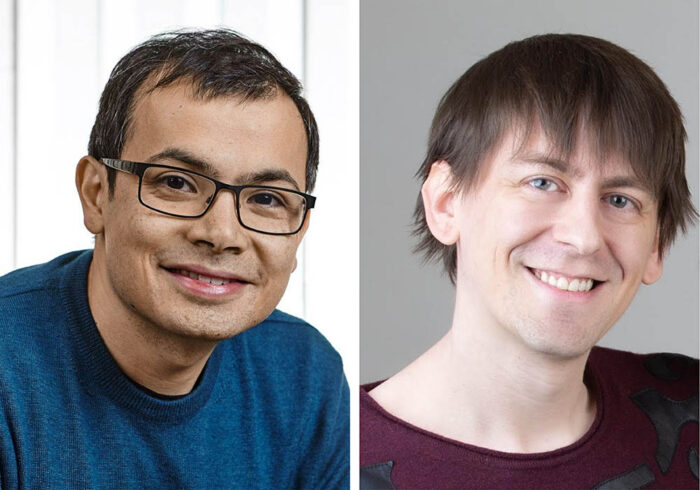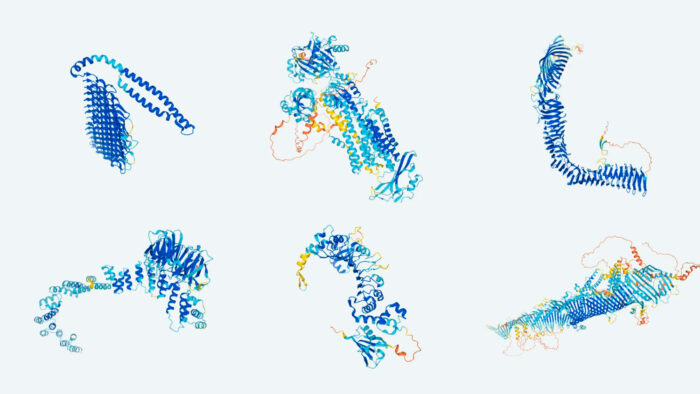
The 2021 John Kendrew Lecture will be given on 13th October at 2:30pm (BST) and 4:00pm (BST) by DeepMind’s Founder and CEO Demis Hassabis and research scientist John Jumper, both instrumental in the company’s AlphaFold project, who will be discussing how artificial intelligence (AI) can help us unravel longstanding scientific problems. Due to ongoing social distancing measures within the LMB the talk will be hosted on YouTube and is open to anyone interested in attending.
DeepMind, founded in 2010, is a leading AI company, aiming to solve intelligence and develop more capable problem-solving artificial systems – known as artificial general intelligence (AGI) – in order to advance science and benefit humanity. The company’s AlphaFold team has used AI to solve the ‘protein folding problem’ of determining what shape, and therefore function, a protein will take based on its sequence of amino acids. Recently, DeepMind launched the AlphaFold Protein Structure Database which contains the most complete and accurate outline of the human proteome to date.
Demis Hassabis
Demis showed impressive coding abilities early on, when he coded the simulation game Theme Park at aged 17. He went on to receive a computer science degree from Cambridge University, before completing a PhD in cognitive neuroscience at University College London and founding the videogame company Elixir Studios. He co-founded DeepMind in 2010, and since then has appeared in the Time 100 list of most influential people, been elected a Fellow of the Royal Society and received a CBE.
Demis will give the first half of the lecture at 2:30pm (BST) titled ‘Using AI to accelerate scientific discovery.’
Lecture abstract:
The past decade has seen incredible advances in the field of Artificial Intelligence (AI). DeepMind has been in the vanguard of many of these big breakthroughs, pioneering the development of self-learning systems like AlphaGo, the first program to beat the world champion at the complex game of Go. Games have proven to be a great training ground for developing and testing AI algorithms, but the aim at DeepMind has always been to build general learning systems ultimately capable of solving important problems in the real world. Excitingly, I believe we are on the cusp of a new era in science with AI poised to be a powerful tool for accelerating scientific discovery itself. We recently demonstrated this potential with our AlphaFold system, a solution to the 50-year grand challenge of protein structure prediction, culminating in the release of the most accurate and complete picture of the human proteome.
John Jumper
John received his PhD in Chemistry from the University of Chicago for developing machine learning methods to simulate protein dynamics. Prior to this he earned a B.S. in Physics and Mathematics from Vanderbilt University and an MPhil in Physics from the University of Cambridge. At DeepMind, John is leading the development of new methods to apply machine learning to protein biology.
John will give the second half of the lecture at 4:00pm (BST) titled ‘Highly accurate protein structure prediction with AlphaFold.’
Lecture abstract:
Predicting a protein’s structure from its primary sequence has been a grand challenge in biology for the past 50 years, holding the promise to bridge the gap between the pace of genomics discovery and resulting structural characterization. In this talk, we will describe work at DeepMind to develop AlphaFold, a new deep learning-based system for structure prediction that achieves high accuracy across a wide range of targets. We demonstrated our system in the 14th biennial Critical Assessment of Protein Structure Prediction (CASP14) across a wide range of difficult targets, where the assessors judged our predictions to be at an accuracy “competitive with experiment” for approximately 2/3rds of proteins. The talk will cover both the underlying machine learning ideas and the implications for biological research.

Background information
The John Kendrew lecture is named in honour of LMB Nobel Laureate John Kendrew. It is one of a series of named lectures organised by the LMB and given by eminent scientists from around the world.
John Kendrew was born in Oxford in 1917 and first came to Cambridge in 1936 as a student at Trinity College, earning a First Class Honours in Chemistry. Curing World War Two, John was recruited to the Air Ministry Research Establishment where he worked on early radar applications, before returning to Cambridge in 1946 to join Max Perutz at the MRC Unit for Research on the Molecular Structure of Biological Systems (now the MRC Laboratory of Molecular Biology). His research focused on protein structure and in 1958 he produced the first three-dimensional structure of a protein: myoglobin. This discovery helped Max to discover the structure of haemoglobin the following year and, in 1962, they were jointly awarded the Nobel Prize in Chemistry. In the 1960′s John jointly founded the European Molecular Biology Organisation (EMBO) and helped create and was first Director of the European Molecular Biology Laboratory (EMBL). He also founded and was Editor in Chief of the Journal of Molecular Biology. From 1981-1987 he was President of St John’s College, Oxford. He died in Cambridge on 23rd August 1997.
Further references:
Deepmind
Poster for the John Kendrew Lecture – Demis Hassabis
Poster for the John Kendrew Lecture – John Jumper
YouTube Link to the Lecture – part 1 and part 2
John Kendrew Biography
LMB Named Lectures